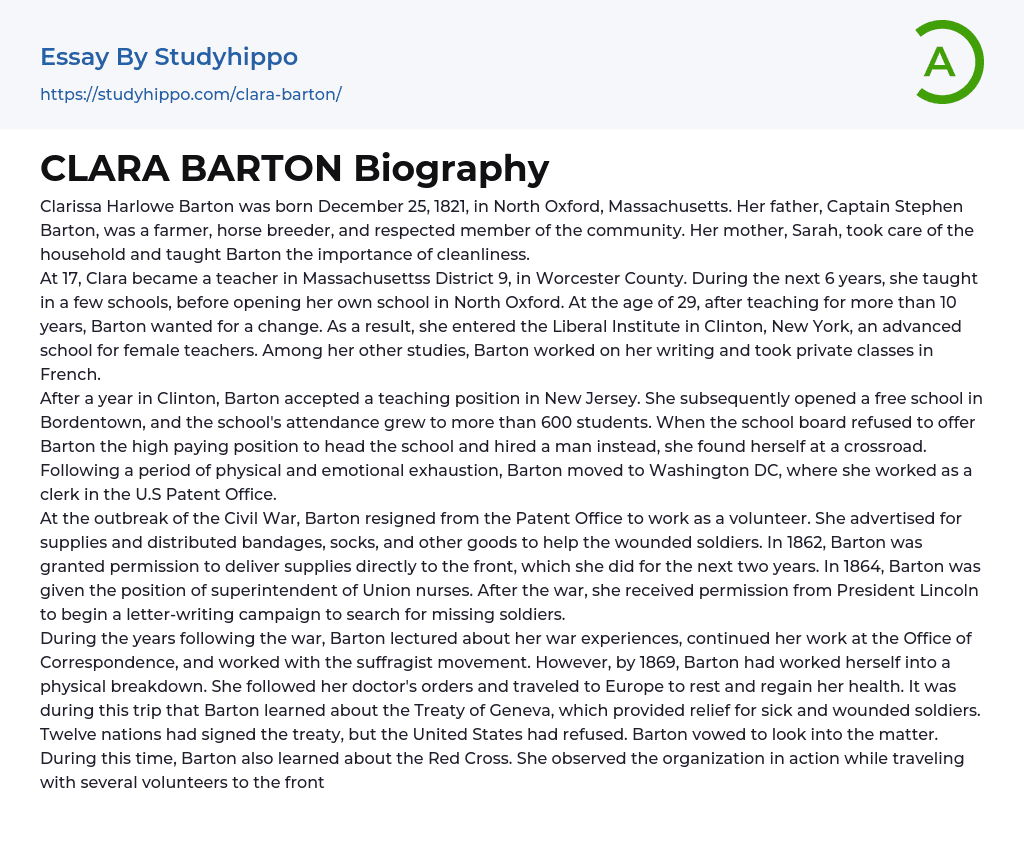Clarissa Harlowe Barton, born on December 25, 1821, in North Oxford, Massachusetts, had a father named Captain Stephen Barton. He was a farmer, horse breeder, and a respected member of the community. Her mother, Sarah, managed the household and taught Barton about the significance of cleanliness. When she turned 17, Clara began working as a teacher in District 9 of Massachusetts, located in Worcester County.
Over the next six years, she taught in several schools and eventually opened her own school in North Oxford. At age 29, after teaching for more than ten years, Barton sought a change and enrolled in the Liberal Institute in Clinton, New York, a prestigious school for female educators. In addition to her other studies, she focused on improving her writing skills and took private French lessons. Following her time in Clinton, Barton accepted a teaching job in New Jer
...sey.
After establishing a free school in Bordentown, Barton witnessed a surge in student enrollment, surpassing 600. Nevertheless, when the school board rejected her appointment as the school's leader and opted to hire a male candidate instead, Barton confronted a crucial choice. Drained both physically and emotionally, she relocated to Washington DC and assumed the position of a clerk at the U.S Patent Office. As soon as the Civil War commenced, Barton relinquished her job at the Patent Office and devoted herself entirely to volunteering.
She placed advertisements seeking supplies and distributed bandages, socks, and other items to aid injured soldiers. In 1862, Barton was authorized to personally deliver supplies to the front lines, a duty she fulfilled for the subsequent two years. By 1864, Barton was appointed superintendent of Union nurses. Post-war, Presiden
Lincoln granted her permission to initiate a letter-writing campaign to locate missing soldiers. In the years after the war, Barton delivered lectures recounting her experiences, continued her duties at the Office of Correspondence, and collaborated with the suffragist movement. However, in 1869, Barton's strenuous efforts resulted in physical exhaustion.
As per her doctor's advice, she traveled to Europe for rest and recuperation. It was during this trip that Barton came across the Treaty of Geneva, which aimed to offer assistance to wounded soldiers. While twelve countries had signed the treaty, the United States had chosen not to do so. Barton made a pledge to further explore this matter. Moreover, she familiarized herself with the Red Cross during this time. While accompanying a team of volunteers on the front lines of the Franco-Russian War, she witnessed firsthand the Red Cross in action.
Upon her return to the United States in 1873, Barton initiated her advocacy for the Treaty of Geneva and the Red Cross. Following a period dedicated to rejuvenating her health at a wellness resort in Danville, New York, Barton relocated to Washington DC to campaign for her causes. Thanks to her relentless dedication, the United States ratified the Geneva Agreement in 1882. Concurrently, the establishment of the American Red Cross organization took place in 1881, with Barton assuming the role of its inaugural president.
After several years, she drafted the American amendment to the Red Cross constitution, which encompassed providing aid for both war and peacetime disasters. Barton held the role of Red Cross president until 1904 and during her tenure, she led relief efforts for various disasters worldwide, including famines, floods, diseases, and earthquakes. The last
relief effort she personally oversaw was for the victims of the Galveston, Texas flood in 1900. Furthermore, Barton represented the Red Cross as a delegate and spoke at multiple International Conferences. However, in 1904, she was compelled to resign from her position as president.
Clara Barton, amid mounting criticism of her leadership style, chose to step down and hand over control of the organization to a larger central administration. Her resignation occurred on May 12. For the next 8 years, she resided in her home in Glen Echo, Maryland. Despite this change, Barton remained healthy and maintained an active lifestyle by riding her horse and keeping abreast of current events. Unfortunately, on April 12, 1912, Barton passed away from complications arising from a cold. Throughout her life, her mission could be summed up by her own words: "You should never consider whether you like it or not or if it is bearable; your thoughts should solely revolve around the need and how to address it."
- Federal government essays
- Armed Forces essays
- Confederate States Of America essays
- Federal Government Of The United States essays
- Fourteenth Amendment To The United States Constitution essays
- Governance essays
- Parliament essays
- Politics essays
- Jurisdiction essays
- Bureaucracy essays
- Separation Of Powers essays
- Congress essays
- President essays
- United States Congress essays
- Non-Commissioned Officer essays
- Appeal essays
- Revenge essays
- Corporate Governance essays
- Public Service essays
- Income Tax essays
- Supply essays
- Red Cross essays
- Democracy essays
- State essays
- Liberty essays
- Absolutism essays
- Reform essays
- Republic essays
- John Marshall essays
- Bourgeoisie essays
- Developed Country essays
- Elections essays
- International Relations essays
- Left-Wing Politics essays
- Monarchy essays
- Political Corruption essays
- Political Party essays
- Political Science essays
- Sovereign State essays
- United Nations essays
- World Trade Organization essays
- Contras essays
- Dictatorship essays
- Foreign policy essays
- Monarch essays
- Corruption essays
- Foreign essays
- Democratic Party essays
- European Union essays
- President Of The United States essays




